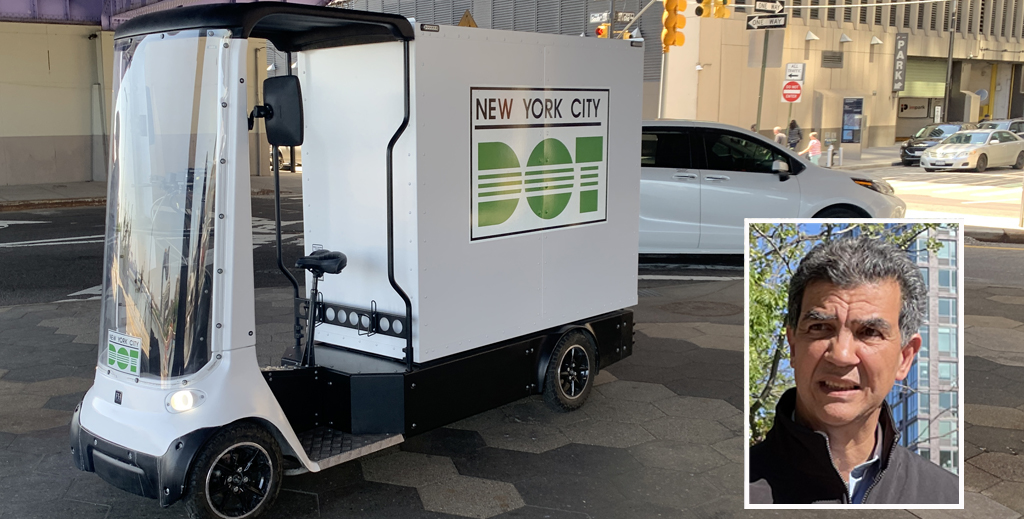Ever since Streetsblog broke the news that the Department of Transportation wants to create new rules for certain types of cargo bikes, the freight industry has been vociferous in its contention that the proposal needs to be tweaked. One industry leader even penned an open letter to DOT Commissioner Ydanis Rodriguez that we posted. Now, the commish fires back at his critics on the pages of Streetsblog, the only place where New Yorkers can stay informed about crucial debates such as this.
New York City has entered an exciting era around micro-mobility — and especially around the possibilities that these new technologies can provide in reducing truck traffic, increasing safety, and fighting climate change. Mayor Eric Adams has made reducing truck traffic — that disproportionately affects communities of color — one of his signature priorities, and during my tenure at DOT, we have done much to advance infrastructure that is shifting us from traditional trucks to more sustainable modes of freight delivery.
Integral to this effort is making the streets more welcoming to bicycles and micro-mobility devices. We are doing this by building more protected bike lanes than ever before, including along some of New York City’s most-challenging corridors; installing harder, “better” barriers along 20 miles of those lanes; and expanding bike parking. I am particularly excited that we have begun the process of widening protected lanes, including along Third Avenue and 10th Avenue in Midtown, where new 10-foot-wide lanes will be able to accommodate the burgeoning number of e-bikes and cargo bikes.
We have seen criticism in Streetsblog in recent days about one of our related initiatives. DOT has proposed rules — on which we are now seeking public comment — that would bring further order to the growing use of cargo bikes. Over four years ago, my predecessor, Commissioner Polly Trottenberg, first promulgated rules that made us among the first American cities to allow and govern the use of pedal-assist bicycles.
Last month, we proposed rules that would expand low or no-emission options for freight deliveries — including packages and groceries — by allowing the use of pedal-assist bicycles that may be up to 48 inches wide, compared to the current maximum width of 36 inches, and have up to four wheels, compared to the current limit of three wheels. This proposal to expand the width and wheel allowance of these bicycles, combined with pedal-assist, makes cargo bikes easier to pedal while carrying larger loads.
It is admittedly a confusing topic, with our rules confined by state law, provisions of which have been amended over recent years. While we await industry, recreational, and additional stakeholder feedback on the proposed rules, we want to separate fact from the fiction that has recently appeared on this website concerning DOT’s plans to further expand the use of cargo bikes.
- “The proposed rule seeks to outlaw throttles on cargo bikes, a feature common on Class 2 and Class 3 e-bikes…”
This is not true. Class 1, 2, and 3 e-cargo bikes that are 36 inches wide or less are legal under state law. Our proposed rules do not change that. Because the city only has authority to regulate pedal-assist devices, state legislation would be required to legalize wider cargo bikes of all classes.
- “The proposed rule specifically restricts the use of powered trailers behind bikes…”
This is also not true. Motorized trailers are already illegal under state law and legalizing them would also require legislation in Albany. The proposed rules do not change the status quo: cargo trailers are allowed when they are pulled by pedal-assist bikes and when the trailer itself has no propulsion mechanism.
- “… the rule seeks to prohibit advertising on cargo bikes.”
This has always been the case. New York City law generally prohibits raising revenue on city streets without getting prior approval through a franchise or concession, such as what the public sees on Citi Bike stations, bus shelters, and buses. This proposed rule also aligns with the “Dining Out NYC” program that Mayor Adams recently signed into law, which similarly prohibits advertising on any outdoor dining setup.
The proposed rules are a starting point. We welcome and rely on public feedback in our rulemaking process, which is why we have a 30-day comment period followed by a public hearing. DOT carefully considers each comment — received in writing or through public testimony — and uses the information to make revisions (both big and small) before any rule is adopted. The rules may in fact require updating later as we reassess the uses of our evolving streets and a growing industry.
In the end, we are seeking to balance sometimes differing perspectives. Thorough research and public engagement help us refine and improve our rules, ensuring that they serve the best interests of all stakeholders.
Again, we encourage feedback from the public (comment can be submitted to rules@nyc.dot.gov through Wednesday, Sept. 13) and expect that what we hear will be useful and constructive. For now, the direction of progress is clear — and my pledge is to continue making our streets safer and more sustainable by expanding the use of cargo bikes and reducing the number of trucks on New York City streets.
A former City Council member, Ydanis Rodriguez is the city’s Transportation commissioner.






